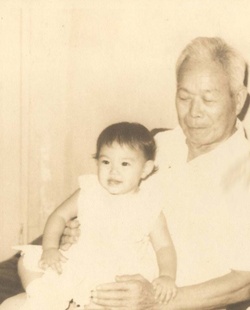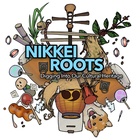It was the most anticipated time of the year--summer vacation--and she was happy she didn’t have to get up early or complete endless homework. She wondered how to spend her free time, since she wasn't allowed to play with the girl next door and there was nothing to see on TV. She thought about what she could do; she’d be scolded for playing on the antique furniture in the living room and the decorations she loved so much. The kitchen and bathroom were off limits for fun, because of the hazards they represented. Nor was she allowed to stay in the bedrooms, and besides, family members were still sleeping.
Despite her short legs, she climbed on top of the patio table to reach a book because she wanted to draw. She pulled out a volume in a strange language, with a great deal of text and images in black and white. When her grandfather found her, he said: “You’ll break your neck if you fall!” She was so engrossed she hadn’t heard his slow footsteps. With a complicit smile that lit up her round face and small eyes, she admitted that she was bored and told him what she planned to do with the document. He explained to her that the book was from his native land, that she wasn’t allowed to draw on it, and that it contained a story he would read to her if she behaved.
Her grandfather laughed, smiling with his almond-shaped eyes, and he showed her how to fold the paper to create different figures. She learned to make cups, hats, animals and a boat. Then the old man read her the story of the “Tortoise and the Hare,” telling her about a song about the story, which he then sang to her in his native language. Little by little, she also learned it. She sang the song to everyone and proudly told everyone who had taught it to her. Her grandfather also taught her to count to ten and say a few phrases in Japanese. In the evenings, he told her Japanese customs and legends, exciting tales full of fantasy.The days went by, and the girl improvised a classroom with couches, patio chairs and an old table she used as a blackboard so her grandfather, along with her dolls, could learn to speak Spanish. She shared all of her knowledge about the language and history of Cuba. But her grandfather struggled to learn so she gave up. It was then that he told her, with a mischievous smile that lit up his thin frame, about his voyage to the Caribbean island by boat, and everything he knew about its culture and its people.
They were always together. She learned to play dominoes and he also taught her about other Japanese games. One evening, happy to be winning a game of dominoes against some boys from the neighborhood, one of the losers became hostile and said: “Don’t cheat, Chinaman.” The old man’s face changed, his friendly smile disappearing as his face hardened, wary. His granddaughter was frightened because she had never seen him argue or become so angry. He strongly reprimanded the boy, and it was clear that he was offended. Later, she learned that for the Japanese, it was offensive to be labeled as being from another Asian country.
Year after year, during the summer vacations the girl and her grandfather repeated these activities, but one day, the old man lost his memory. Because of a terrible disease, he forgot everything about Cuba. He couldn’t remember a word in the Spanish spoken in the country he had adopted as his own. He was only able to speak in Japanese and sing the songs of his childhood. He makes many paper boats with trembling hands and invites her to go sailing with him.
* * * * *
Our Editorial Committee selected this article as one of her favorite Nikkei Roots: Digging into Our Cultural Heritage stories. Here is the comment.
Comment by Alberto J. Matsumoto
This is a very moving story where Akemi recalls the happy times she shared with her grandfather. He had emigrated from Japan to the Caribbean island of Cuba and participated in organizing the Japanese association and the Japanese school there, contributing to the development of the Nikkei community in its beginnings. However, despite his efforts, those institutions no longer exist.
Akemi's grandfather taught her about origami as well as Japanese fables and legends.
Although she doesn’t speak much Japanese, she understands the importance of what he taught her.
Unfortunately, today her grandfather has senile dementia and while he is unable to recall his experiences in Cuba, he does remember the Japanese language and his early life in Japan. He was never able to return to Japan to visit his loved ones, but through this essay one can feel that yearning remained with him.
This year marks the 120th anniversary of Japanese immigration to Cuba. It’s a year of commemoration.
Today, many Nikkei are able to visit Japan or study there. But it is important for today's generations, the third or fourth generations, to know that there was a time when it wasn’t easy to return to Japan. This essay gives the reader a sense of that hard reality, which is why I chose it.
© 2018 Akemi Figueredo Imamura
Nima-kai Favorites
Each article submitted to this Nikkei Chronicles special series was eligible for selection as the community favorite. Thank you to everyone who voted!









